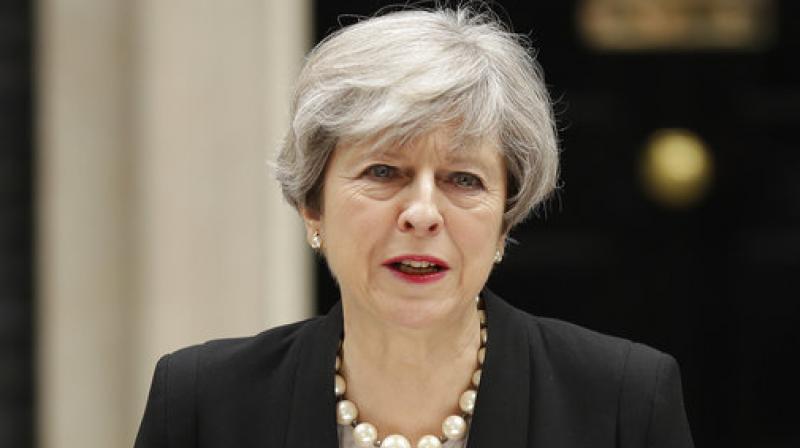Britain's Theresa May in tough talks on forging governing alliance

London: British Prime Minister Theresa May on Tuesday was heading into difficult talks with a hardline Northern Irish party on securing a working majority after a crushing electoral setback.
Coming off a bruising few days in which her future has hung in the balance, May will hope to secure a deal to prop up her minority government when she meets Arlene Foster, head of Northern Ireland's ultra-conservative Democratic Unionist Party (DUP), on Tuesday morning.
May's Conservatives unexpectedly lost their majority in parliament in last Thursday's snap general election, unleashing political chaos ahead of Brexit talks with the European Union, which are set to start next Monday.
The disastrous result also prompted calls -- from within her own party -- for her resignation, leading May to apologise to her own MPs on Monday evening.
"I got us into this mess, and I'm going to get us out," May told Conservatives MPs, seeking to ward off any challenge to her leadership.
Falling eight seats short of retaining its parliamentary majority, May's Conservative party is now in talks with the DUP -- which won 10 seats -- to forge an informal alliance.
'Positive engagement'
DUP leader Arlene Foster said there had been "positive engagement" so far. "We are going into these talks with the national interest at heart," she said on Monday.
However, the prospect of a deal between the two parties has caused disquiet, with the DUP's anti-abortion and gay rights stance in the crosshairs.
More than 735,000 people have signed a petition in three days condemning the proposed alliance, saying it is a "disgusting, desperate attempt to stay in power".
The deal also prompted Irish premier Enda Kenny to warn that such an alliance could upset Northern Ireland's fragile peace.
In a phone call on Sunday, Kenny told May that forming a minority government reliant on the support of the hardline DUP could pose a "challenge" to the 1998 Good Friday peace accords.
London's neutrality is key to the delicate balance of power in Northern Ireland, which was once plagued by violence over Britain's control of the province.
May's office responded that the DUP deal "would provide stability and certainty for the UK going forward".
Defence Secretary Michael Fallon has also sought to downplay the DUP's future role, saying the government was not looking at a formal coalition but would seek assurances that the DUP would vote with May "on the big things".
The crunch talks could also force the delay of the government's presentation of its legislative programme to parliament by Queen Elizabeth II, due on June 19.
"Obviously until we have that we can't agree the final details of the Queen's Speech," said May's deputy, Damian Green, referring to an agreement with the DUP.
Changing position on Brexit
May will then travel to Paris for a working dinner with French President Emmanuel Macron before the two leaders attend a friendly football match between England and France at the national stadium in Paris.
The prime minister had hoped to be in the French capital with a strong popular mandate for a "hard" Brexit.
Instead she finds herself weakened and isolated as she meets Macron, a 39-year-old neophyte who rode to victory in last month's presidential elections and is on course for a landslide victory in France's legislature.
"Being seen to be the prime minister" could help "shore up her authority at home," according to Colin Talbot, professor of government at the University of Manchester.
It could also be the place for May "to change her position on Brexit," he added.
Since coming to power, May has advocated a "hard" Brexit, which would entail Britain leaving the European single market and cutting immigration from the bloc.
Macron and May are also expected to discuss the need for closer cooperation at the European level to fight terrorism, which they discussed at the G7 in Italy and at a NATO summit in Brussels late last month.
"I would expect that conversation to continue tomorrow. They may well discuss aspects of Brexit but the main focus will be on counterterrorism," May's spokesman said on Monday.

